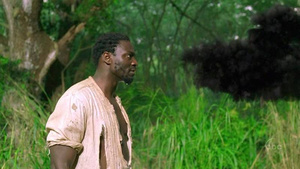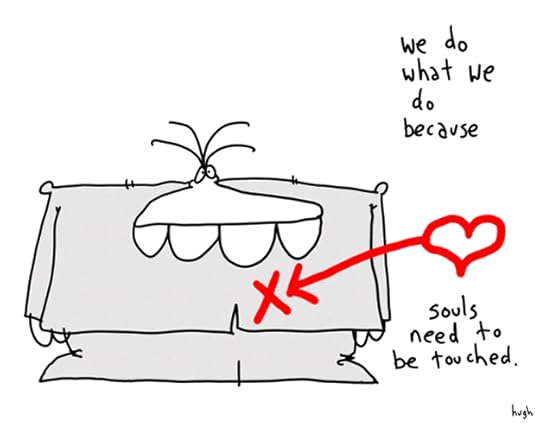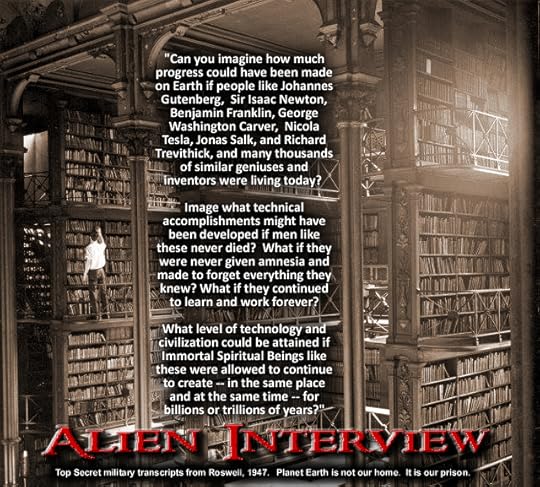Lawrence R. Spencer's Blog, page 417
January 22, 2017
SOLITUDE
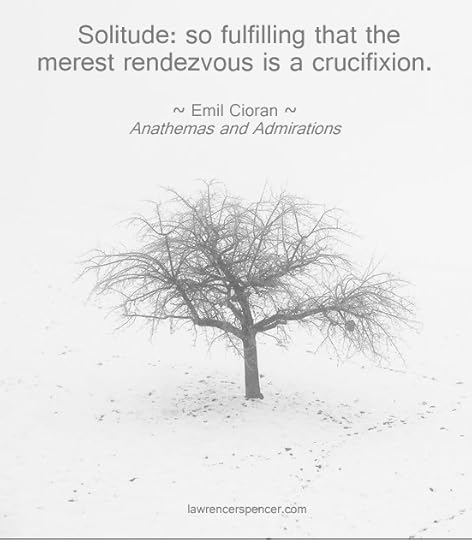 Emil Cioran 8 April 1911 – 20 June 1995) was a Romanian philosopher and essayist, who published works in both Romanian and French. Cioran was born in Resinár (Rășinari), Szeben County, which was part of Austria-Hungary at the time. His work has been noted for its pervasive philosophical pessimism, and frequently engaged with issues of suffering, decay, and nihilism. Among his best known works are On the Heights of Despair (1934) and The Trouble with Being Born (1973). Cioran’s first French book, A Short History of Decay, was awarded the prestigious Rivarol Prize in 1950. The Latin Quarter of Paris was his permanent residence and he lived much of his life in isolation with his partner Simone Boué. (Wikipedia.org)
Emil Cioran 8 April 1911 – 20 June 1995) was a Romanian philosopher and essayist, who published works in both Romanian and French. Cioran was born in Resinár (Rășinari), Szeben County, which was part of Austria-Hungary at the time. His work has been noted for its pervasive philosophical pessimism, and frequently engaged with issues of suffering, decay, and nihilism. Among his best known works are On the Heights of Despair (1934) and The Trouble with Being Born (1973). Cioran’s first French book, A Short History of Decay, was awarded the prestigious Rivarol Prize in 1950. The Latin Quarter of Paris was his permanent residence and he lived much of his life in isolation with his partner Simone Boué. (Wikipedia.org)
January 21, 2017
BE WILDE
“The truth is rarely pure and never simple.”
― Oscar Wilde, The Importance of Being Earnest
“Yes: I am a dreamer. For a dreamer is one who can only find his way by moonlight, and his punishment is that he sees the dawn before the rest of the world.”
― Oscar Wilde, The Critic as Artist
“Never love anyone who treats you like you’re ordinary.”
― Oscar Wilde
“Who, being loved, is poor?”
― Oscar Wilde
“I don’t want to be at the mercy of my emotions. I want to use them, to enjoy them, and to dominate them.”
― Oscar Wilde, The Picture of Dorian Gray
“Whenever people agree with me I always feel I must be wrong.”
― Oscar Wilde
————————————————————–
Oscar Fingal O’Flahertie Wills Wilde (16 October 1854 – 30 November 1900) was an Irish writer and poet. After writing in different forms throughout the 1880s, he became one of London’s most popular playwrights in the early 1890s. Today he is remembered for his epigrams, his only novel (The Picture of Dorian Gray), as well as his plays.
Originally posted 2013-11-15 00:25:12. Republished by Blog Post Promoter
January 20, 2017
EMPATHY
Definition of EMPATHY
1
: the imaginative projection of a subjective state into an object so that the object appears to be infused with it
2
: the action of understanding, being aware of, being sensitive to, and vicariously experiencing the feelings, thoughts, and experience of another of either the past or present without having the feelings, thoughts, and experience fully communicated in an objectively explicit manner.
3
: Ability to imagine oneself in another’s place and understand the other’s feelings, desires, ideas, and actions. The empathic actor or singer is one who genuinely feels the part he or she is performing. The spectator of a work of art or the reader of a piece of literature may similarly become involved in what he or she observes or contemplates.
Originally posted 2013-06-04 23:33:38. Republished by Blog Post Promoter
January 19, 2017
TEN UNTRANSLATABLE WORDS
Language is composed of symbols to which significance or meaning have been assigned. It cannot express the ineffable. The following article, by Esther Inglis-Arkell, illustrates the ineffability of certain concepts.
___________________________________
“English is so limited sometimes. There are so many kickass words in other languages, that describe concepts that we just don’t have one word for in English. And that’s a shame, because sometimes we find ourselves in situations that English just can’t describe.
Science fiction and fantasy are full of those sorts of quirky situations and concepts, in fact. Here are 10 words that have no English equivalent, and the science fiction and fantasy classics that you’d want to use them to describe.
10. Aware (Japanese)
The Meaning: Aware is a word, quite well-known, for the bittersweetness of a brief and fading moment of transcendent beauty. It’s that “last burst of summer” feel, or the transience of early spring.
The Work: The Lord of the Rings is the work that most needs this word to describe it. Sure, it’s an adventure and linguistics tale, but backing the battles is an ever-present tone. The whole point of this fantasy trilogy is a chronicling of the end of an era. The days of magic, both terribly evil and extraordinarily beautiful, are coming to an end. With destruction of the ring — the ultimate evil in the world — all the good of the dwarves and hobbits and elves retreat from the world as well, and the age of myth gives way to the more prosaic age of humans.
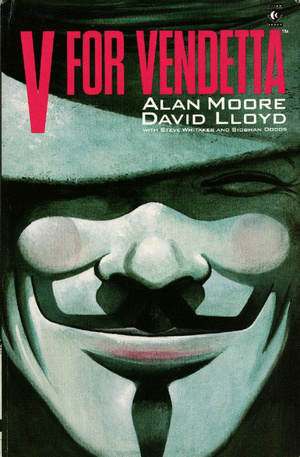 9. Maya (Sanskrit)
9. Maya (Sanskrit)
The Meaning: This word is one that could be applied to a lot of protest movements and many political speeches. It refers to belief — the often unfortunate belief — that the symbol of a thing is the same as the thing itself. It’s the, “Ceci n’est pas une pipe,” of the literary world.
The Work: V for Vendetta is a work that plays with symbolism and how symbolism becomes real in the eyes of the populace. The eponymous V is armed with a mountain of symbols, from the letter and roman numeral of his name to a particular kind of rose to London buildings to the Guy Fawkes mask that he always wears. Whether this mistaken belief — that a guy playing around with cops and bombs can free a whole country — would actually lead to the kind of sweeping social change depicted in the book is up to you to decide.
8. Wei-wu-wei (Chinese)
The Meaning: Wei-wu-wei is conscious nonaction. It’s a deliberate, and principled, decision to do nothing whatsoever, and to do it for a particular reason.
The Work: Zone One, by Colson Whitehead is the non-action zombie novel. Leaving aside stupid comparisons in reviews that shall remain linkless, it is an understandably frustrating book. The narrative meanders through the current clean-up job, past wanderings, and extended social commentary of a man in a post-apocalyptic zombie wasteland. It’s light on action and heavy on description and sustained metaphor. Whether you think this is a good thing or a bad thing, you know it’s a deliberate thing. Our own Charlie Jane Anders review of the book states, “you get the sense, after a while, that Whitehead is deliberately trying to deny the reader any feeling of narrative satisfaction, through denseness and obfuscation.” It’s a definite wei-wu-wei novel.
The Meaning: A bricoleur is someone who starts building something with no clear plan, adding bits here and there, cobbling together a whole while flying by the seat of their pants.
The Work: Oh, golly. We can all think of at least five different series that were worked on by some real bricoleurs, can’t we? But I’d have to say that Lost is the most recent, and the most startling, one of them. They seemed to be making it up since the beginning and hoping no one noticed. Bricoleurs don’t always make a shamble of things. The word can also refer to someone whose loose and improvisational style leads to an inventive and engaging whole. Doctor Who, in its continuous broadcasting under many different creative directors, can be said to be a, um, bricolage? And the series has built an engaging world with something for everyone.
6. Schlimmbesserung (German)
The Meaning: A schlimmbesserung is a supposed improvement that makes things worse. There are actually a lot of words for this in a lot of languages, and that makes me think that English needs to get on the ball and coin a native word for this concept. Everyone needs it.
The Work: Did people want the ‘first’ episodes in the Star Wars series? You bet they did. Did they need them? Debatable. Did that new-old trilogy add anything to what was already there? No. Quite the opposite. And you could say the same for the many re-released CGI upgrades that the original movies received over the years. Some things shouldn’t be improved. Or at least, certainly not in the way they were.
5. Orenda (Huron)
The Meaning: Orenda is the invocation of the power of human will to change the world around us. It is set up to be the opposing force to fate or destiny. If powerful forces beyond your control are trying to force you one way, orenda is a kind of voiced summoning of personal strength to change fate.
The Work: For me, the most interesting part of the Matrix Trilogy was the part that can be described by orenda. I wasn’t too impressed by the first movie’s reveal of Neo as the chosen one, or the idea of all of reality being fake. What I liked was when we got to the second movie, and all that ‘chosen one’ stuff fell victim to the power of predictability and statistics. Neo wasn’t the chosen one. He was a familiar protocol, and he and his fellow humans would obey the dictates of that protocol. Changing that, and the moment when he went from embracing his ‘destiny’ to fighting it, was the point of the series, I thought.
The Meaning: This one means ‘a wasted opportunity.’ Specifically it means an opportunity that was wasted by ineptness being hurled at it from all directions.
The Work: Sounds like the on-air run ofFirefly to me. I’m not among those fans who think that Firefly would have been a runaway success. It was a risk. It was a niche genre in a niche genre. Still, it seems like jumbling up the episodes and airing them, you know, whenever, was a bad way to handle an original concept.
3. Weltschmerz (German)
The Meaning: It could be termed world-weariness or ennui, but this particular has the quirk of almost only being applied to privileged young people.
The Work: Can anyone place the follow lyrics: Life can’t be easy/ It’s not always swell./ Don’t tell me truth hurts, little girl./ ‘Cause it hurts like hell. The fact that this was sung to, and about, a fifteen-year-old LARPing suburbanite with a room over-crowded with toys, a closet full of costumes, and a loyal pure-bred sheep dog makes Labyrinth the perfect movie to embody this word. What makes it even better is it is a call for such people to grow up and be more mature, all the while adding in enough dramatic elements that real-life people in the same situation (and let me reluctantly raise my hand, here) felt that it really spoke to them. I still love Labyrinth. It’s a fun and well-done movie. But it definitely resonated with a certain demographic.
 2. Kalpa (Sanskrit)
2. Kalpa (Sanskrit)
The Meaning: Time passing on a cosmic scale
The Work: That’s what 2001: A Space Odyssey is all about. Everything, from the music to the subject matter to the deliberate invocation of shapes and symbols as a way of signalling both change and continuity, was meant to show how the ‘cosmic’ passage of unimaginable amounts of time. Since we’re now well past 2001, perhaps Kalpa would have been a better title for the movie, and novel, in the first place. But who knew – for sure – that it had that kind of staying power?
1. Razbliuto (Russian) Update: Or English!
The Meaning: This word, pronounced ros-blee-OO-toe, describes the feeling that a person (generally meant to be a man) has for the person who he once loved, but now no longer loves.
The Work: Take your pick. I have my eye on a few big franchises nowadays that I think will cause a lot of people some razbliuto in a few years. Maybe even a few months. For me personally, though, I suppose I’ve come full circle to The Lord of the Rings. I adored it at one age, and read it over and over on car trips and at school under the desk, and late at night with my room light being switched off – not at all sneakily, I’m sure – whenever my parents came by. And while I respect the work and world-building that went in to it, I have no desire to pick it up ever, ever again. I didn’t even see the movies. And there’s a reason why I added the pronunciation guide to this particular word. I think it needs to get in to circulation in general, since everyone knows the feeling of loving a story at one particular time in their life, and then that love falling away. But I suspect this kind of feeling is particularly strong in sci-fi and fantasy fans. These works don’t just offer a book to love, but an entire world to immerse oneself in, with every character, situation, and story a shining possibility. The stories in these genres can mold themselves to people’s inner lives more than realistic fiction can. But inner lives change, and the things that fill us with joy and inspiration at one point in our lives simply aren’t relevant at other points. While there are plenty of sci-fi and fantasy stories that endure, there are many that drop away as we change. There are some former Ann Rice fans out there who have something to say to Twilight fans. There are people who love Xena who have something to say to fans of Katniss. But to say it, they have to know the word. So say it with me: ros-blee-OO-toe.”
THIS IS A REPOST OF AN ARTICLE BY Esther Inglis-Arkell, from the book They Have a Word for It by Howard Rheingold, via io9
Originally posted 2012-04-28 16:32:48. Republished by Blog Post Promoter
January 18, 2017
A LOVE POEM
MY ETERNAL COMPANION, WITHOUT END,
BEFORE THE BEGINNING, MY IMMORTAL FRIEND….
WE’RE ALWAYS TOGETHER THOUGH WE’RE APART.
I KNOW YOU’RE HERE…. WHO YOU REALLY ARE!
MY MOST ADORED, MY BLESSED FRIEND!
ON EARTH WE’RE LOST…. ABANDONED, AND….
FAR FROM THE HOME WHERE WE BEGAN.
I CAN’T REMEMBER WHO I’VE BEEN!
WHEN WAS THE START? DID I KNOW YOU THEN?
YET, WITHIN THE TIMELESS ‘WHO’ I AM
I KNOW THAT YOU ARE MY ETERNAL FRIEND!
YOU ARE THE ‘WHO’ THAT I ADORE!
YOU WILL ALWAYS BE! FOREVER MORE!
WHEN THE ‘ETERNAL GAME’ IS AT AN END,
YOU WILL REMAIN MY IMMORTAL FRIEND!”
Lawrence R. Spencer. 2013.
Originally posted 2013-09-23 21:04:22. Republished by Blog Post Promoter
January 17, 2017
DO OVER HAIKU
TOUCHING SOULS
January 16, 2017
POLITICAL MEAT
January 15, 2017
POSTER GIRLS
January 14, 2017
TECHNICAL POTENTIAL
VISIT THE WEBSITE and BLOG for the book at www.alieninterview.org and www.alieninterview.org/blog
“Can you imagine how much progress could have been made on Earth if people like Johannes Gutenberg [i] (Footnote), Sir Isaac Newton, Benjamin Franklin, George Washington Carver, [ii] (Footnote) Nicola Tesla, Jonas Salk, [iii] (Footnote) and Richard Trevithick, [iv] (Footnote) and many thousands of similar geniuses and inventors were living today?
Image what technical accomplishments might have been developed if men like these never died? What if they were never given amnesia and made to forget everything they knew? What if they continued to learn and work forever?
What level of technology and civilization could be attained if Immortal Spiritual Beings like these were allowed to continue to create — in the same place and at the same time — for billions or trillions of years?” — Airl, Pilot-Officer-Engineer of The Domain
[i] “… Johannes Gutenberg…”
“Johannes Gensfleisch zur Laden zum Gutenberg (c. 1400 – February 3, 1468) was a German goldsmith and printer, who is credited with inventing movable type printing in Europe (c. 1439) and mechanical printing globally. His major work, the Gutenberg Bible, also known as the 42-line bible, has been acclaimed for its high aesthetic and technical quality.
Although Gutenberg was financially unsuccessful in his lifetime, the printing technologies spread quickly, and news and books began to travel across Europe much faster than before. It fed the growing Renaissance, and since it greatly facilitated scientific publishing, it was a major catalyst for the later scientific revolution. Gutenberg is thought to have said: “Give me 26 soldiers of lead and I shall conquer the world.”
Printing was also a factor in the Reformation: Martin Luther found that the 95 Theses, which he posted on the door of his church, were printed and circulated widely; subsequently he also issued broadsheets outlining his anti-indulgences position (ironically, indulgences were one of the first items Gutenberg had printed). The broadsheet evolved into newspapers and defined the mass media we know today.”
— Reference: Wikipedia.org
[ii] “… George Washington Carver…”
“George Washington Carver (July 12, 1864 – January 5, 1943) was an American botanical researcher and agronomy educator who worked in agricultural extension at the Tuskegee Institute in Tuskegee, Alabama, teaching former slaves farming techniques for self-sufficiency.
George Washington Carver reputedly discovered three hundred uses for peanuts and hundreds more uses for soybeans, pecans and sweet potatoes. Among the listed items that he suggested to southern farmers to help them economically were adhesives, axle grease, bleach, buttermilk, chili sauce, fuel briquettes, ink, instant coffee, linoleum, mayonnaise, meat tenderizer, metal polish, paper, plastic, pavement, shaving cream, shoe polish, synthetic rubber, talcum powder and wood stain. Three patents (one for cosmetics, and two for paints and stains) were issued to George Washington Carver in the years 1925 to 1927; however, they were not commercially successful in the end. Aside from these patents and some recipes for food, he left no formulas or procedures for making his products. He did not keep a laboratory notebook.
Carver’s most important accomplishments were in areas other than industrial products from peanuts, including agricultural extension education, improvement of racial relations, mentoring children, poetry, painting, religion, advocacy of sustainable agriculture and appreciation of plants and nature. He served as a valuable role model for African-Americans and an example of the importance of hard work, a positive attitude and a good education. His humility, humanitarianism, good nature, frugality and lack of economic materialism have also been widely admired.
One of his most important roles was that the fame of his achievements and many talents undermined the widespread stereotype of the time that the black race was intellectually inferior to the white race. In 1941, “Time” magazine dubbed him a “Black Leonardo”.
— Reference: Wikipedia.org
[iii] “… Jonas Salk…”
“Jonas Edward Salk (October 28, 1914 – June 23, 1995) was an American biologist and physician best known for the research and development of the first effective polio vaccine.
While being interviewed by Edward R. Murrow on “See It Now” in 1955, Salk was asked: “Who owns the patent on this vaccine?” Surprised by the question’s assumption of the requirement of a profit-motive for his creation, he responded: “There is no patent. Could you patent the sun?”
— Reference: Wikipedia.org
[iv] “…Richard Trevithick…”
“ Richard Trevithick (born April 13, 1771 in Cornwall – died April 22, 1833 in Kent) was an English inventor, mining engineer and builder of the first working railway steam locomotive.”
— Reference: Wikipedia.org
Nikola Tesla (10 July 1856 – 7 January 1943) was a Serbian American inventor, electrical engineer, mechanical engineer, physicist, and futurist best known for his contributions to the design of the modern alternating current (AC) electricity supply system. — Reference: Wikipedia.org (Tesla is an Officer of The Domain also, according to these Top Secret interviews)
Originally posted 2014-04-23 19:41:39. Republished by Blog Post Promoter



